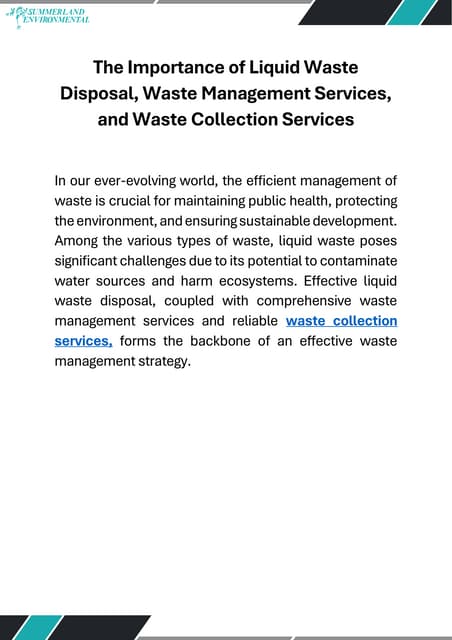An Unbiased View of Reclaim Waste
An Unbiased View of Reclaim Waste
Blog Article
Reclaim Waste - Questions
Table of ContentsReclaim Waste for DummiesThe Facts About Reclaim Waste RevealedReclaim Waste for BeginnersSome Known Facts About Reclaim Waste.Some Of Reclaim Waste
Residential sewer waste refers to the waste and products from a domestic septic storage tank. The appropriate management and disposal of domestic sewer waste call for liquid waste to be transferred to a sewer treatment plant where the appropriate methods and tools are applied to detoxify and dispose of waste.
Industrial waste frequently includes possible dangers, such as combustible materials or a mixture of fluid and solid waste products, and calls for an extra innovative and detailed disposal process. The disposal of business waste normally entails the purification of waste before transport to ensure secure and correct disposal. Hazardous waste is produced from by-products and runoff of industrial procedures and production.
This type of waste can not use the exact same sewer administration transport or procedures as septic or business fluids. The hazardous waste management process needs the evaluation and testing of liquid waste prior to it goes through the disposal process (liquid waste disposal). Drainage waste is the fluid waste that comes from drainage and excess stormwater in very inhabited locations or cities
Runoff waste can trigger contamination and flooding otherwise dealt with properly. Find out more concerning sewage system cleaning and waste management. Guaranteeing correct waste administration can avoid catastrophes and decrease environmental damage. Both individuals in property settings and specialists in business or production industries can gain from recognizing the processes and laws of liquid waste monitoring.
Reclaim Waste Fundamentals Explained
Call PROS Services today to discover our waste monitoring and disposal solutions and the appropriate ways to look after the fluid waste you generate.
(https://reclaimwaste1.carrd.co/)Do you understand what occurs to your water when you pull the plug, purge the bathroom or drain the washing device? No? Well, it deserves recognizing. This so-called 'wastewater' is not just an important resource yet, after treatment, will be released to our land, rivers or the ocean. Utilized water from toilets, showers, baths, cooking area sinks, laundries and industrial procedures is known as wastewater.

water used to cool machinery or tidy plant and devices). Stormwater, a type of wastewater, is overflow that moves from agricultural and metropolitan areas such as roofing systems, parks, gardens, roads, courses and seamless gutters right into stormwater drains pipes, after rainfall. Stormwater moves neglected directly to neighborhood creeks or rivers, eventually getting to the ocean.
More About Reclaim Waste
In Queensland, most wastewater is treated at sewer therapy plants. Wastewater is moved from residential or industrial sites with a system of sewage systems and pump stations, referred to as sewage reticulation, to a sewage therapy plant. Regional federal governments construct, keep and run most sewer treatment plants. Operators are certified under the Environmental Management Act 1994 to discharge cured wastewater at an appropriate ecological criterion into waterways.
The Department of Natural Resources encourages neighborhood federal governments about managing, operating and maintaining sewerage systems and treatment plants. In unsewered locations, city governments may call for owners to mount private or Visit This Link home sewage therapy systems to treat domestic wastewater from bathrooms, kitchen areas, restrooms and laundries. The Division of Natural Resources authorizes making use of family systems when they are confirmed to be efficient.
Most stormwater receives no treatment. In some new neighborhoods, therapy of some stormwater to eliminate trash, sand and gravel has begun utilizing gross pollutant catches. Wastewater therapy takes place in four phases: Eliminates strong issue. Larger solids, such as plastics and various other things incorrectly discharged to sewers, are eliminated when wastewater is travelled through displays.
Wastewater then streams right into huge storage tanks where solids work out and are removed as sludge. Grease and scum are skimmed from the surface. Makes use of small living microorganisms referred to as micro-organisms to damage down and remove staying dissolved wastes and great particles. Micro-organisms and wastes are incorporated in the sludge. Gets rid of nitrogen and phosphorus nutrients that can cause algal blooms in our rivers and endanger marine life.
Fascination About Reclaim Waste
Nutrient removal is not readily available at all sewage therapy plants since it requires costly specialized tools. Clear liquid effluent generated after therapy may still consist of disease-causing micro-organisms - liquid waste disposal.

This usually suggests wastewater has actually to be dealt with or impurities removed before it can be discharged to waterways. Many wastewater moves right into the sewage system. Under the Act, neighborhood governments provide approvals and licences for environmentally pertinent tasks (Periods) involving wastewater launches that may have a regional impact. The department provides approvals and permits to ERAs including wastewater launches that might have a local or statewide impact.
Examine This Report on Reclaim Waste
Monitoring provides valid information regarding water top quality and can confirm that licence problems are being satisfied. The info acquired with surveillance gives the basis for making water top quality choices.
Report this page